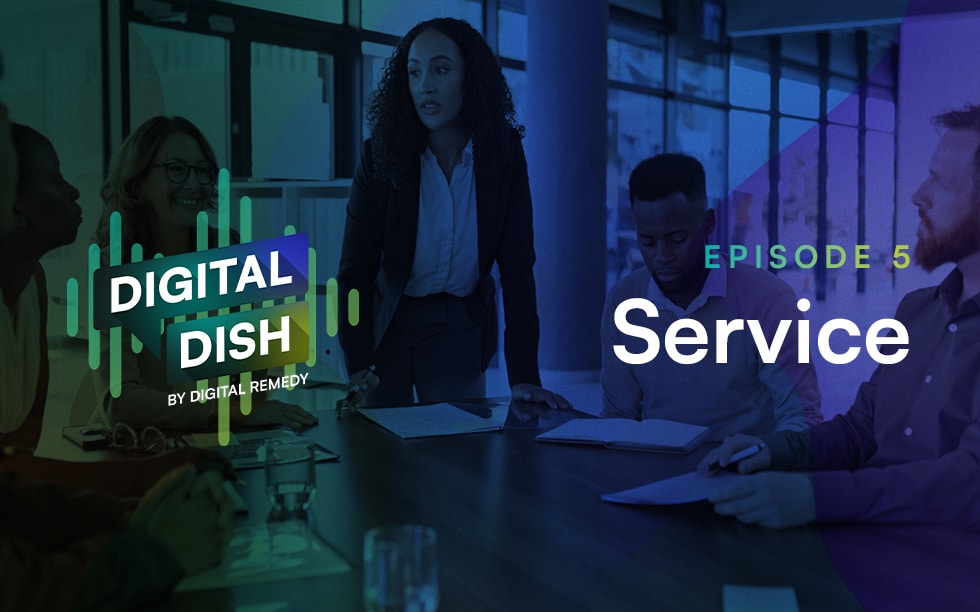Apr 19, 2024
Welcome to the fifth episode of The Digital Dish, where we dish on all things ad tech! In our latest episode, we examine what great service means in the AdTech industry. Tune in to hear testimonials from the performance experts across our Client and Optimization Services, Product, and Marketing teams. They’ll share our unique approach…

Welcome to the fifth episode of The Digital Dish, where we dish on all things ad tech! In our latest episode, we examine what great service means in the AdTech industry. Tune in to hear testimonials from the performance experts across our Client and Optimization Services, Product, and Marketing teams. They’ll share our unique approach to relationship building and how we strategize across departments to overcome challenges and develop custom performance media solutions to go above and beyond for our agency and brand-direct clients.
Prefer to read? Here’s the transcript:
[00:00:00] Gabby Turyan, Director of Product Marketing: Welcome to the latest episode of The Digital Dish, where we talk about what good service looks like. You’ll hear from a couple of the folks at Digital Remedy talk about what good service looks like to them. Stay tuned.
[00:00:23] Richard Francone, Senior Director of Media Buying: Good service comes down to three basic things. Responsiveness, professionalism, and proactiveness. As long as you’re combining those three things and doing them effectively, I think you’re servicing the client really well.
[00:00:34] Caroline Morant, Product Marketing Manager: Good service is a blend of empathy and expertise. I think it’s about, you know, listening and understanding.
Really meeting clients where they are. And then using that expertise to get them where they want to be.
[00:00:48] Michael Juhas, SVP of Client Services: When you have a good symbiotic relationship between a client and partner, you’re able to accomplish so many more things in terms of actually delivering upon the objectives that clients are trying to achieve.
[00:01:02] Matt Engstrom, VP of Marketing: The most important thing is to be able to put yourself in your client’s shoes, to be able to understand their business, their role, their personal challenges and their business challenges well enough to be able to anticipate their needs and not just be available when something is not going right, but to be proactively ready to recommend new strategies or new opportunities to create value for that client.
[00:01:29] Sophie Kirk, VP of Client Services: Service and trust go hand in hand. To be able to provide quality service to your clients, they must trust you. They have to have that relationship with you to understand that they can rely on you, you are accountable and you will provide excellent service.
[00:01:41] Annie Skivington, Sr. Media Planner: Trust is a key component in every relationship and it’s important to have trust in every member of your team so that there’s an expert at every step of the way that can keep things running smoothly.
[00:01:50] Michael Juhas, SVP of Client Services: The best way to establish trust is time. Anyone that tells you that you can build trust right away is living in a different world. You really need to show results to build trust. And you do that by over investing in them, truly understanding what they’re trying to achieve, and then building solutions and offerings that help deliver upon what their objectives are.
[00:02:19] Richard Francone, Senior Director of Media Buying: So what does customer service look like when things aren’t going well. That’s an important aspect of customer service. We want to make sure that we’re maintaining an open and honest conversation with our clients, including them in the problem solving process and using our industry knowledge to get all the important stakeholders involved.
And presenting legitimate solutions, not just band aids for a problem, but legitimate solutions.
[00:02:41] Sophie Kirk, VP of Client Services: There are going to be mistakes that happen, there are going to be challenges every single day, and the ability to be truthful with your client of exactly what happened, bring an action plan forward, and bring that resolution to them is always going to be the best case scenario to ensure they understand that you take this seriously and you’re here to help them forward through that mistake or roadblock that they might have.
[00:03:06] Annie Skivington, Sr. Media Planner: So throughout a campaign, there might be issues that come up, whether you’re not meeting your KPIs or your goals. And when that happens, it’s important to stay solution oriented and to stay calm so that the client doesn’t feel like you’re also stressed. Coming up with solutions off the bat that you can bring to the client is great.
One thing that we do with my clients is that every time a campaign finishes, we do a full audit of that campaign. And that way in the future, we can think about what worked and what didn’t.
[00:03:34] Richard Francone, Senior Director of Media Buying: Technology plays a really, really important role in providing good customer service. And it works on two fronts.
It works internally here at Digital Remedy. And it works externally for our clients as well. Clients are able to utilize our technology to maintain knowledge of their campaign and what’s going on on a day to day basis. And at the same time, technology internally helps promote efficiency so that we’re running as smoothly as possible, as efficiently as possible so that we can meet and beat any, any client needs that may come up.
So technology not only promotes participation, but it also promotes efficiency and transparency as well.
[00:04:11] Michael Juhas, SVP of Client Services: People are extremely important in delivering results, but when you’re able to leverage technology to get from point A to point B quicker, you have much more likelihood in delivering client objectives.
[00:04:22] Gabby Turyan, Director of Product Marketing: I don’t think that proprietary technology is the end all be all.
I think it’s the idea that you have great technology built to solve a specific challenge that is then leveraged by amazing people who know how the technology can work best and then optimize those two together. And you have above and beyond service. You have phenomenal service. So it’s really thinking about building proprietary tech.
For example, like a reporting and insights tool that’s unifying a pool of data streams. And then really having your account managers, your client service team, your, your commercial team, being able to, to look into that piece of technology and pull out those insights that the media and optimization team were working closely on.
So it’s really having a combination of both because tech alone can’t solve for all of those challenges.
[00:05:22] Sophie Kirk, VP of Client Services: You know, what really sets digital remedy apart is not only our tenure with our employees. A lot of the employees across our teams have been here five plus years. Within our industry, that’s unheard of.
Another piece is that our ability to own and innovate our own technology allows for our clients to efficiently access endpoints that they’re not able to elsewhere. Digital Remedy has focused on service from the beginning. We look at building our employees to be cross department functioning so that they have that background in the technical side.
Maybe they worked in media buying to begin with and now they’re account managers. This allows for them to have fully educated conversations with their clients to ensure there’s no middlemen or anything lost in communication. Our account managers are providing service because they are those topic experts.
[00:06:12] Gabby Turyan, Director of Product Marketing: Digital Remedy has been around for 23 plus years and what we can all attest to is that we hire really great talent and really great people. People that are driven, optimistic and really hungry for a challenge. And so you can see that being reflected departmentally. We’re consultative in the way that we address any specific client challenges.
We’re cognizant of the industry they’re in. So perhaps they’re, you know, in the travel sector or in the CPG sector. So we’re cognizant of the audiences that they’re trying to target. Sort of the overall economic landscape, any industry challenges that may be applicable towards them.
And keeping all of those specific points in mind, we can start to build plans that are really custom to solve for their challenges. And we go above and beyond because we’ve started to think about travel specific solutions, CPG specific solutions, and really building out custom strategies in order to meet the needs and the challenges of our clients without them being too general.
[00:07:23] Matt Engstrom, VP of Marketing: I think service at Digital Remedy is so strong for a particularly unique reason. And I think that it’s from day one, service is ingrained into every single employee. So even if you don’t necessarily work in a client facing role, you are very much focused on, on understanding how to provide value for clients.
And everybody in the organization is taught that and it’s ingrained in us from day one. And I think it’s also interesting that it translates into the culture itself, like we as a business are very much focused on people, taking care of people, making sure that everybody has a great experience working here at Digital Remedy and that empathetic approach and ethos can easily be translated into the way that we’re interacting with clients on a day to day basis.
Interested in learning more about our best-in-class service and award-winning media technology? Speak to a team member today.
Catch up on previous Digital Dish episodes on our YouTube page and sign up for our Trends & Insights newsletter for the latest industry updates.
Related Posts

In the constantly evolving digital advertising landscape, agility and flexibility are paramount. As agencies and advertisers look to maximize.

When COVID-19 upended the world in early 2020, the ripple effects were swift and far-reaching across every industry, and.

As artificial intelligence continues to dominate headlines and industry conversations, confusion still lingers—especially around the relationship between artificial intelligence.